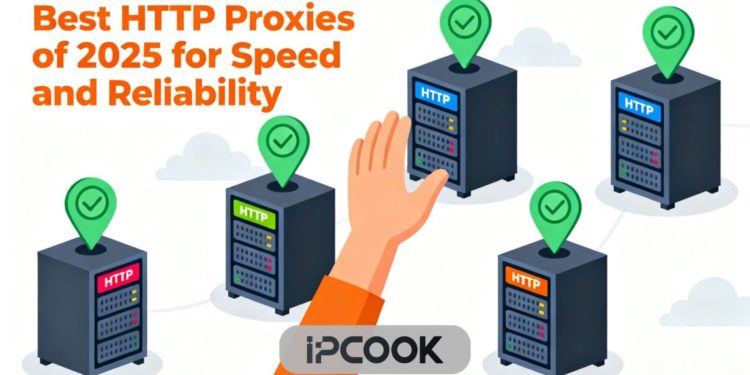If you’ve ever tried to browse anonymously, scrape some data, or access region-locked content, you’ve probably heard about HTTP proxies. I use them all the time in my work, and let me tell you, they’re absolute game-changers. Think of them as your personal middleman – they handle your web requests, help you fly under the radar, and can even speed up your browsing by caching data.
But honestly, with so many providers shouting about being the “best HTTP proxy” out there, figuring out which one to trust can be a real headache. You’re probably wondering, “Which one is actually reliable, fast, and won’t break the bank?” Well, you can relax now. I’ve tested dozens of services to save you the trouble, and I’m about to walk you through a handpicked list of the most effective HTTP proxy servers you can get your hands on today. Let’s dive in and find your perfect match!
6 Best HTTP Proxies for Business Projects and Individual Use
Let’s cut right to the chase. I know you’re here for the recommendations, so I won’t hold you up with a long intro. After putting these services through their paces, I’ve curated this list of the most reliable and efficient HTTP proxy servers. Whether you’re running a large-scale business operation or a personal project, one of these is sure to be a perfect fit.
Option 1. IPcook
User Rating: 4.5/5
Of all the HTTP proxy services I’ve tested, IPcook consistently stands out, especially for its exceptional focus on privacy. It’s a real game-changer for anyone who needs to operate discreetly online. What truly impresses me is its high anonymity (elite proxy) feature. Your real IP is completely hidden, with no leaking of tell-tale headers like X-Forwarded-For, which makes your traffic appear to come from a genuine residential user.
Combine that with a massive pool of over 55 million real residential IPs across 185+ locations, and you have a service that lets you fly completely under the radar. It’s not just about hiding; it’s also incredibly fast, with average global response times under 0.5 seconds, which makes a huge difference during tasks like web scraping.
Here’s a quick breakdown of its key specs to give you a clearer picture:
- Level of Anonymity: High anonymity (Elite)
- Size of IP Pool: 55M+ residential IPs, 185+ locations
- Features: Customizable rotation (by request/time); sticky sessions (up to 24h); high concurrency (100,000 threads at max); short response time (<0.5s)
- Support: 24/7 customer support via phone, email, and live chat
- Free Trial: 0.1GB free trial traffic for new users
- Prices: Pay-as-you-go plans for residential proxies
- Basic: $3.2/GB
- Advanced: $60/25GB
- Small Enterprise: $800/1000GB
- Enterprise: $5000/10000GB
Option 2. Decodo
User Rating: 4/5

Coming right after IPcook, Decodo (ex Smartproxy) is another powerhouse I’ve personally had great results with. Its biggest strength, in my opinion, is its massive global network and user-friendly design. I found their dashboard incredibly straightforward to navigate, which is a huge plus if you’re not looking for a complicated setup. It’s a solid choice for general web scraping and managing multiple accounts without breaking a sweat.
That said, no service is perfect. While its large IP pool is a major advantage, I’ve read some user reports suggesting its proxy sourcing isn’t as transparent as some competitors. It’s something to keep in mind if full supply-chain ethics are a top priority for you.
Here’s a quick look at Decodo’s key specs:
- Level of Anonymity: High anonymity
- Size of IP Pool: 125M+ IPs
- Features: User-friendly dashboard; city-level targeting; built-in scraping tools
- Support: 24/7 customer support
- Free Trial: 3-day free trial for new users
Option 3. Webshare
User Rating: 4/5

If you’re just starting out with proxies or are watching your budget, Webshare is a name you’ll hear a lot. I see it as the friendly and incredibly affordable entry point into the world of HTTP proxy services. Their standout feature is definitely the generous free plan, which gives you 10 free proxies and 1GB of bandwidth monthly without even needing a credit card. It’s perfect for kicking the tires on a small project. Beyond that, their dashboard is refreshingly simple to use, making it easy to get everything set up.
Now, for the trade-off. This focus on being budget-friendly means their customer support isn’t as robust as some premium competitors. They do offer support, but don’t always expect 24/7 real-time chat, which can be a pain if you run into a tricky problem outside of business hours. It’s a service that works very well when it works, but you might need a bit of patience if you require help.
Here’s a quick look at Webshare’s key specs:
- Level of Anonymity: High anonymity
- Size of IP Pool: 80M+ IPs
- Features: Simple dashboard; static & rotating IPs; supports HTTP & SOCKS5 protocols
- Support: Customer support via email, WhatsApp, and Telegram
- Free Trial: 10 free proxies with 1GB monthly bandwidth (no credit card required)
Option 4. Infatica
User Rating: 3.5/5
If you’re running heavier business tasks like large-scale web scraping, Infatica is a name you’ll likely come across. I see it as a workhorse that’s built more for power and reliability than for flashy features. Its biggest strength in my testing was the quality of its residential proxies, which come from a pool of over 20 million IPs sourced from real user networks. This makes it a robust choice for data-intensive projects where you need to avoid getting blocked.
But here’s the catch. All that power comes at a cost, literally. I found Infatica to be on the pricier side compared to some other options, which might make smaller teams or individual users think twice. It’s also worth noting that some reviews point out that its performance can be average in terms of speed.
Here’s a quick look at Infatica’s key specs:
- Level of Anonymity: Anonymous
- Size of IP Pool: 20M+ residential IPs
- Features: Country-level targeting; suited for web scraping
- Support: Email and ticket support
- Free Trial: No free trials; 7-day trial for $4
Option 5. Thordata
User Rating: 3.5/5

When it comes to serious data-intensive projects, Thordata is a service you should definitely consider. I’ve been impressed by its strong focus on reliability and performance, boasting an impressive 99.82% success rate and an average response time of just 0.41 seconds. With a massive pool of over 60 million residential IPs across more than 195 countries, it’s a powerhouse designed for large-scale web scraping and market research without getting blocked.
That said, all this power does come with a bit of a learning curve. While their dashboard is functional, I found it a bit less intuitive for absolute beginners compared to some other services. It’s a platform that truly shines for users who have some technical experience.
Here’s a quick look at Thordata’s key specs:
- Level of Anonymity: Anonymous
- Size of IP Pool: 60M+ residential IPs
- Features: Smart IP rotation; city-level targeting; sticky sessions (10-90 min)
- Support: Support for WhatsApp, Teams, and email
- Free Trial: Yes, based on your monthly usage
Option 6. Cherry Proxy
User Rating: 3/5

Wrapping up my list is Cherry Proxy, a service that I find really stands out for its massive global reach and straightforward, budget-friendly pricing. It’s a fantastic option if your projects, like web scraping or managing multiple social media accounts, require a diverse set of IPs from around the world without a hefty price tag. With over 80 million IPs across 195+ countries and a 99% connection success rate, it’s built for reliability and scale.
While its large pool is a major plus, I’ve noticed that during peak demand, the speed for some of the less common locations might not be as fast as its core network. It’s a minor trade-off for the affordability, but something to keep in mind if you need consistently low latency from every single region.
Here’s a quick look at Cherry Proxy’s key specs:
- Level of Anonymity: Anonymous
- Size of IP Pool: 80M+ IPs, 195+ countries
- Features: Country, ISP & ZIP code filtering; pay-as-you-go billing; supports HTTP & SOCKS5 protocols
- Support: Email & WhatsApp support available
- Free Trial: Not available
HTTP vs SOCKS Proxies: The Differences
Now that we’ve looked at some top services, you might have noticed that many support different proxy protocols. I often get asked to break down the core difference between an HTTP proxy and a SOCKS proxy—let’s clear that up quickly.
What Are HTTP Proxies?
In simple terms, an HTTP proxy is a specialist for handling web traffic. It’s designed specifically for HTTP and HTTPS protocols, which are basically the languages of web browsers. It acts as a smart middleman; it can understand your web requests, cache data to speed up loading times, and even filter content. The key difference with HTTPS is that while the proxy handles the connection, the actual content of your communication with a secure website remains encrypted end-to-end.
Here are some of the most common places you’d find it handy:
- Web Scraping & Data Aggregation: It’s my go-to for reliably gathering public data from websites at scale without getting my own IP blocked.
- Anonymous Browsing: It helps mask your real IP address, letting you browse the web with a greater degree of privacy.
- Content Filtering: Many organizations use them to control and monitor internet access, blocking unwanted sites.
- Accessing Geo-Restricted Content: Need to view a website only available in another country? An HTTP proxy with a local IP can make it happen.
What Are SOCKS Proxies?
Think of a SOCKS proxy as a more versatile, general-purpose tunnel. Unlike its HTTP cousin, which is built for web browsing, a SOCKS5 proxy (the latest version) doesn’t care about the type of traffic you send through it. It simply relays all data packets between your device and the server, fantastic for non-web activities like gaming or torrenting. The core difference is that while an HTTP proxy understands and can filter web content, a SOCKS proxy is a “dumber” pipe: it’s faster for raw data transfer but doesn’t inspect or cache anything.
You’d typically use a SOCKS proxy for:
- Torrenting and P2P Sharing: It’s great for handling the heavy, continuous data flow from file-sharing networks.
- Online Gaming: It can help reduce lag and bypass geo-restrictions on game servers.
- Emailing through Different Protocols: It works with traffic beyond just HTTP, like SMTP or POP3.
- General Purpose Browsing and Streaming: It handles all types of traffic, making it a flexible, all-in-one solution.
FAQs About HTTP Proxies
Q1: Is it safe to use an HTTP proxy?
Honestly, it is generally very safe, as long as you use a reputable HTTP proxy from a trusted provider. The key is choosing a high-anonymity service that encrypts your connection and doesn’t log your activity. If you want that extra peace of mind, I’d recommend opting for an HTTPS proxy specifically, as it adds an additional layer of encryption for your web traffic.
Q2: Which one is better, HTTP or SOCKS proxies?
Neither is universally “better”, as it really depends on your task! For anything web-related like scraping or browsing, an HTTP proxy is usually the perfect, specialized tool. But if you need to handle all kinds of traffic, like for gaming or torrenting, then a more versatile SOCKS proxy is the way to go.
Wrapping-Up
This guide has covered a lot, from my hands-on tests of the best HTTP proxy servers to breaking down the HTTP vs SOCKS proxy debate. For tasks where high anonymity and reliability are non-negotiable, like sensitive web scraping, my go-to choice remains IPcook. Its elite-level privacy and massive pool of real residential IPs consistently deliver the performance I need.
But that’s not the only option! The key takeaway is that the right tool depends entirely on your project. And remember, many providers offer a free trial, so you can test them yourself. I hope this guide helps you cut through the noise while choosing the most suitable HTTP proxy for your task.









































































